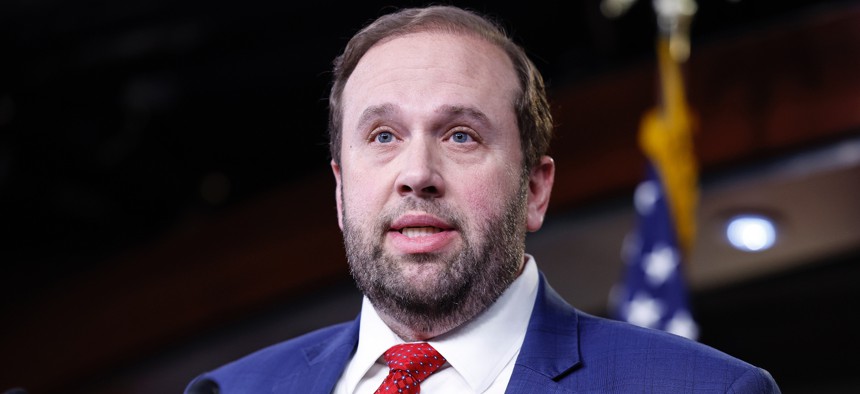Lawmakers clash during hearing about unemployment insurance fraud

House Ways and Means Committee chair Jason Smith (R-Mo.) tried to lay the blame for pandemic unemployment benefits fraud squarely on congressional Democrats at a Wednesday hearing. Anna Moneymaker / Getty Images
While House members pointed fingers over fraudulent payouts from pandemic-era programs, watchdogs offered recommendations for action, including new tech and data-sharing tools.
Many Democrats and Republicans on the House Ways and Means Committee said Wednesday they believe that clamping down on unemployment insurance fraud is a bipartisan goal, but they still clashed over who is to blame for massive swells in fraud in jobless aid programs following the pandemic.
Amid the skirmish, oversight officials offered suggestions at a Wednesday committee hearing to beef up their own ability to go after fraudsters and prevent future scams with tech investments and increased data sharing.
Committee chair Jason Smith (R-Mo.) said in his opening statement that “there’s no question folks needed help, which is exactly why Congress should have protected this program and those who needed it against the criminals who exploited it to commit fraud,” adding that “Democrats in Washington turned a blind eye.”
Ranking member Richard Neal (D-Mass.) took issue with the statement, saying that the jobless aid system and changes Congress made to expand it at the start of the pandemic helped the economy recover.
“We do not on the Democratic side defend fraud,” he said. “We restored the jobs that were necessary in America. It should be a banner of success that we're celebrating this morning, Republican and Democrat.”
At the start of the pandemic, Congress made new jobless aid programs to cover workers left out of traditional benefits and upped the amount of benefits and their timeframe – an influx of cash that made the benefit a target for fraudsters.
A confluence of factors led to fraud surges – understaffing and underfunding in state labor offices, antiquated technology systems and policy decisions made by Congress to ensure aid got out quickly, like initially not requiring certification for pandemic unemployment assistance, something Congress later changed. States were also dealing with massive surges in claims for benefits.
Fraudulent payments were made to individuals filing with stolen identities, to individuals filing in multiple states, filing on behalf of deceased individuals and more. State systems were also targeted by fraudsters based in Nigeria, China and Russia, said Michael Horowtiz, chair of the Pandemic Response Accountability Committee.
Although it is clear that fraud in the jobless aid system did spike during the pandemic, it will take years to get exact numbers, Horowitz told the House committee.
Labor Department Inspector General Larry Turner included an estimate in written testimony that at least $191 billion in unemployment payments were improper — a figure that includes fraudulent payments, but also overpayments and underpayments in addition — with a “significant portion” attributed to fraud between March 2020 and September 2021, although he said that number is likely higher.
Of interest to several Republicans was guidance issued to states by the Labor Department in early 2022 that directed them not to go after overpayments made where the claimant isn’t at fault and expanded the use of blanket waivers for those situations.
While that guidance does state that recovery activities for fraudulent overpayments would not be waived, Rep. Adrian Smith (R-Neb.) said that the concern is that “DOL provided an easy opportunity for them to forgo the investigation and fact-finding needed to know whether they were fraudulent in the first place” and “further eliminated any incentive for states to track down fraud.”
DOL’s Office of the Inspector General is planning on reviewing the policy this year, Turner said.
In terms of recouping money given to fraudsters, the watchdogs also had asks of their own.
Turner said that his office is still up against problems accessing jobless aid data, which he asked lawmakers for assistance with, and resource limitations. He and other witnesses also implored lawmakers to extend the statute of limitations for unemployment fraud, which is set to expire in early 2025.
Horowitz also asked lawmakers to raise the jurisdictional limit for administrative recoveries to $1 million from $150,000 “because of our concern that lower dollar frauds may not make it through that thicket for prosecution,” and asked that lawmakers make the data analytics center set up for COVID-19 relief oversight permanent.
Better utilizing tech, data-sharing and analytics for combating fraud, especially for state offices doling out jobless aid, was another thread of debate, with Rep. Jimmy Panetta (D-Calif.) positing lawmakers should consider standards for unemployment tech across state systems, something Horowitz said is a “key question for Congress.”
“I think it would be a good idea to have some minimum national standards… particularly for IT systems, particularly if you want those systems to be able to talk to one another and be able to cross match,” added Gene Dodaro, U.S. Comptroller General and Government Accountability Office leader.
The issues also got attention from President Biden as part of his State of the Union address on Tuesday, saying that the government needs to “triple our anti-fraud strike forces going after these criminals, double the statute of limitations on these crimes and crack down on identity fraud by criminal syndicates stealing billions of dollars from the American people.”
He did not, however, follow up on an executive order he previewed in the same speech in 2022 on identity theft in public benefits with "broad governmentwide directives" and new actions to help victims of identity fraud.
White House officials told FCW, “The truth is, President Biden secured historic funding to strengthen anti-fraud measures including to help states modernize their unemployment systems and detect and prevent fraud, empowered Inspectors General to strongly monitor programs and appointed a chief pandemic prosecutor to crack down on bad actors, which has already led to the return of more than a billion dollars to the American people.”






